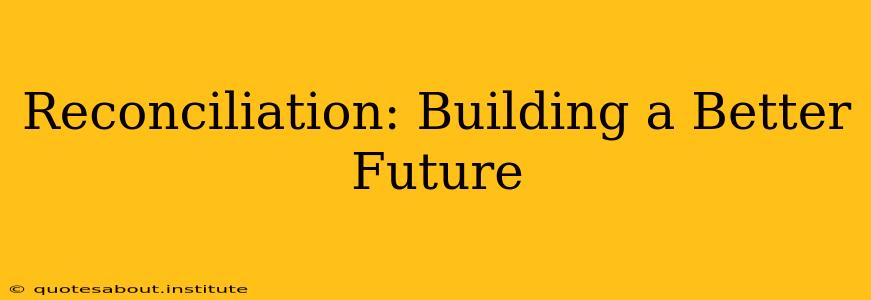Reconciliation is a complex and multifaceted process, vital for healing past wounds and building a more just and equitable future. It's not simply about forgetting the past; it's about acknowledging harm, addressing its root causes, and working collaboratively to create a society where everyone feels valued and respected. This process is crucial in various contexts, from interpersonal relationships to national efforts to heal from historical trauma. This article delves into the intricacies of reconciliation, exploring its challenges, benefits, and strategies for building a better future.
What is Reconciliation?
Reconciliation is the process of restoring friendly relations. It involves acknowledging wrongdoing, expressing remorse, and actively working towards repairing the damage caused. This goes beyond a simple apology; it requires a genuine commitment to change behaviors and systems that perpetuate harm. In the context of societal reconciliation, it often involves addressing historical injustices, systemic oppression, and ongoing inequalities. It demands empathy, understanding, and a willingness to engage in difficult conversations.
What are the Steps Involved in Reconciliation?
The path to reconciliation is rarely linear; it requires patience, persistence, and a willingness to engage in continuous dialogue. Key steps often include:
- Acknowledgement of Harm: This involves openly recognizing and acknowledging past injustices and their lasting impact. This isn’t about assigning blame but accepting responsibility for the harm caused.
- Truth-telling and Remembrance: Sharing stories, creating memorials, and establishing truth and reconciliation commissions are crucial for bringing hidden histories to light and honoring victims.
- Justice and Accountability: While not always possible, pursuing justice for past wrongs is essential for building trust. This may involve legal processes, reparations, or other forms of redress.
- Repair and Healing: This phase focuses on rebuilding relationships, restoring trust, and creating pathways for healing and recovery for both individuals and communities.
- Transformation and Prevention: This is the long-term goal, aiming to create systemic changes that prevent similar harm from occurring in the future.
What are the Challenges in Achieving Reconciliation?
The path towards reconciliation is fraught with challenges. These include:
- Denial and Resistance: Some individuals or groups may deny that any harm occurred, making it difficult to initiate a process of reconciliation.
- Power Imbalances: Existing power dynamics can impede reconciliation, as those in power may be unwilling to relinquish control or make amends.
- Trauma and Mistrust: The trauma caused by past injustices can create deep-seated mistrust, making it challenging to build bridges between conflicting parties.
- Differing Narratives: Conflicting accounts of past events can make it difficult to reach a shared understanding of the past.
How Long Does Reconciliation Take?
There is no set timeframe for reconciliation. It's a complex and ongoing process that can take years, even generations, to achieve. The time it takes depends on various factors, including the severity of the harm, the willingness of all parties to participate, and the resources available to support the process.
What are the Benefits of Reconciliation?
The benefits of reconciliation are far-reaching and extend to individuals, communities, and society as a whole. Successful reconciliation can lead to:
- Improved Relationships: Stronger, healthier relationships between individuals and groups are built on a foundation of trust and understanding.
- Increased Social Cohesion: A more cohesive and inclusive society results when people from diverse backgrounds feel a sense of belonging and shared identity.
- Reduced Conflict: Addressing past grievances can help prevent future conflict and promote peaceful coexistence.
- Economic Growth: Reconciliation can foster economic stability by creating a more just and equitable environment.
How Can I Contribute to Reconciliation?
Individuals can play a crucial role in promoting reconciliation by:
- Educating Themselves: Learning about the history of conflict and injustice is essential for understanding the root causes of division.
- Engaging in Dialogue: Participating in respectful conversations with those from different backgrounds can build bridges and foster understanding.
- Supporting Reconciliation Initiatives: Contributing to organizations or projects that promote reconciliation can make a significant difference.
- Promoting Empathy and Understanding: Developing empathy and compassion for others is key to fostering a culture of peace and reconciliation.
Reconciliation is not a quick fix; it's a journey that requires ongoing commitment and effort from all involved. However, the benefits of a more just and equitable society make it a worthy endeavor, essential for building a better future for everyone.

